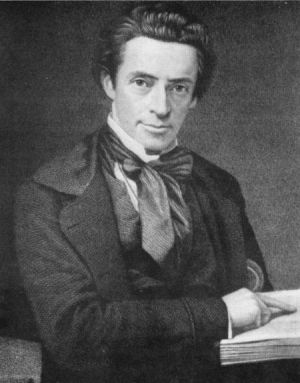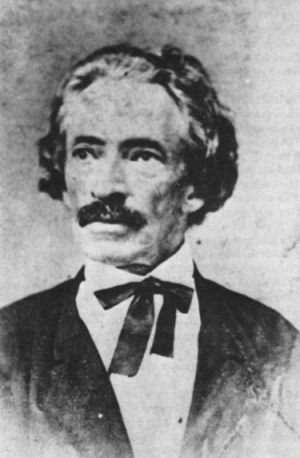Benjamin Porter
Benjamin Faneuil Porter (born November 17, 1808 on Sullivan's Island, South Carolina; died June 4, 1868 in Greenville, Butler County) was a physician, attorney, state legislator, judge, author, publisher, editor, law professor, railway pioneer, and member of the University of Alabama Board of Trustees.
Porter was the son of Benjamin Richardson and Eliza Seabrook Fickling Porter of South Carolina. He began his career in a counting house and then undertook the study of medicine under Dr Eli Geddings in 1822 and under Dr Thomas Legaré in 1823. He then switched to studying law under Judge William Crafts in 1824 and was admitted to the South Carolina Bar on November 22, 1825. For the next two and a half years he worked for George Eckhart in Charleston. In 1828 he moved to Chesterfield in the northern part of the state and became a partner to Robert Clendenin. While there he married the former Eliza Taylor Kydd. In December 1829 he and his new bride traveled to Claiborne, a settlement overlooking the Alabama River in Monroe County.
In 1830 Porter secured professional licenses as both a physician and an attorney from the State of Alabama. After successfully pleading in defense of a man accused of murder, he entered a law partnership with Judge James Dellet which continued until 1835. While thus employed he was appointed to the Monroe County Circuit Court by Governor John Gayle on January 2, 1832. That fall he won the first of three elections to represent Monroe County in the Alabama House of Representatives from 1832 to 1834. In 1834 he was engaged as an attorney for the University of Alabama and participated in settling various questions relating to the grant of federal lands for the support of the University. He moved to Tuscaloosa in 1835 and added the responsibilities of serving as reporter to the Supreme Court of Alabama, editing fourteen volumes of important early decisions establishing Alabama's pattern of jurisprudence.
In 1836 Porter was again elected to the state legislature, representing Tuscaloosa County. A speech he delivered that year in opposition to capital punishment was published and widely distributed. In 1839 he authored legislation establishing the first state penitentiary, an institution aimed at the rehabilitation of inmates, which was later constructed in Wetumpka.
Porter broke with Democrats over Jackson's stance during the Nullification Crisis and served as part of a Whig minority in the state capitol. In 1840 he was one of the founding members of the Tuscaloosa Odd Fellows Lodge, and he helped to establish twenty-one other lodges across the state. In 1840 he was nominated for a seat in the newly-created 10th Judicial Circuit of Alabama in Mobile and effectively cleared the court's entire docket within a few short months. His nomination was challenged however, and he resigned before the issue was taken up in the state Supreme Court. He returned to North Alabama in time to preside at a convention in support of the Whig candidacy of Benjamin Harrison in Tuscumbia on October 16. In 1842 Porter published a handbook for executors and administrators of wills and estates. In 1844 he traveled with presidential candidate Henry Clay and spoke on his behalf at the Whig convention in Baltimore, Maryland.
In 1845 Porter joined the University faculty as chair of the University of Alabama School of Law. He was offered a position in Zachary Taylor's administration later that year, but was forced to withdraw after suffering a broken leg in a stagecoach accident on the way to Washington. He recuperated at a summer home in Cave Springs, Georgia. In 1846 he published a handbook of common and statute law as it pertained to execution of the office of Sheriff in Alabama and Missisippi. During the 1847 legislative session he introduced a bill that would have secured a common fund for education, had it passed. In 1848 he supported the establishment of a Tennessee & Coosa Railway that would help connect Alabama to growing markets. He delivered a commencement address to the Ciceronian and Phi Delta Societies at Mercer University in 1850 and returned to his birthplace for a year as editor of The Charleston News. While there he penned a biographical profile of John Calhoun for The American Whig Review.
In 1851 Porter returned to his summer residence in Georgia, then moved to DeKalb County, Alabama where he launched The Wills Valley Post newspaper, which he used to promote the development of railroads and schools in the South. He opened a law office and founded a high school. The community honored him by naming itself "Porter Town" (later "Porterville") in his honor. He chartered the Wills Valley Railroad and served as its first president, while relocating his family to a farm near Sydney in Marshall County. In 1852 he supported the candidacy of Franklin Pierce for President. In 1853 he bought The Marshall Eagle, then resold it to William Ricketts and Samuel Manning. He founded his own rival, The Tennessee Valley, in 1856.
In the early 1860s Porter returned to South Alabama, founding a hospital in Greenville and serving as its mayor during the Civil War. Like his fellow Whigs, Porter opposed secession, but once war was declared, he supported the Southern forces. Confederate President Jefferson Davis commissioned Porter as a Colonel and placed him in charge of a training camp in Butler County. With government funds he expanded the hospital which was staffed by volunteers to treat wounded soldiers throughout the conflict. Porter was publicly asked to run for Governor of Alabama, notably by the editors of the Selma Sentinel in 1861 and 1865. He joined the Republican Party after the Confederate surrender and was appointed to the bench on the 12th Judicial District. He died in Greenville in 1868 of heart failure and is buried in that city's Pioneer Cemetery. He and Eliza had ten children, including one adopted niece.
Porter worked on a memoir, which was edited by Sara Wells and published in 1983 as Reminiscences of Men and Things in Alabama.
Publications
- Porter, Benjamin F. (1836) "Address Delivered Before the Philomathic Society of the University of Alabama."
- Porter, Benjamin F. (1842) The Office and Duties of Executors and Administrators.
- Porter, Benjamin F. (1845) "The Past and the Present: A Discourse Delivered Before the Erosophic Society of the University of Alabama."
- Porter, Benjamin F. (1846) "Argument of Benjamin F. Porter, in Support of a Bill . . . to Abrogate the Punishment of Death."
- Porter, Benjamin F. (1983) Reminisces of Men and Things in Alabama. Edited by Sara Wells. Tuscaloosa: Portals Press. ISBN 0916620565
References
- Porter, Benjamin F. (1983) Reminisces of Men and Things in Alabama. Edited by Sara Wells. Tuscaloosa: Portals Press. ISBN 0916620565
- Pruitt, Paul McWhorter Jr (March 22, 2012) "Benjamin Faneuil Porter" Encyclopedia of Alabama - accessed February 16, 2017

